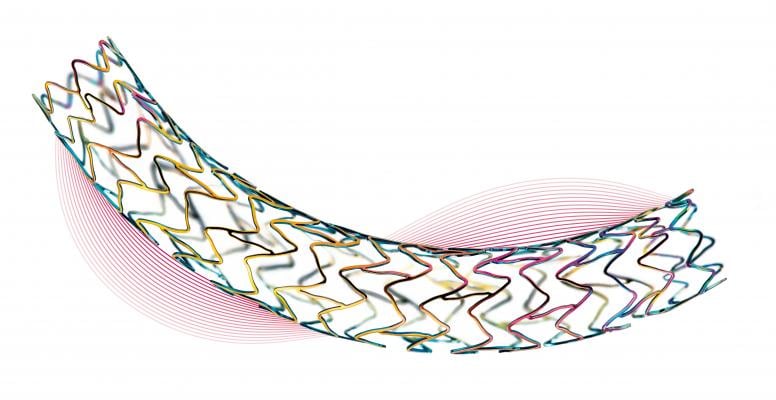
September 5, 2019 — Biotronik's ultrathin Orsiro stent demonstrated superiority over Xience with respect to target lesion failure (TLF) at 12 months, according to newly released data from the BIOSTEMI trial.1 At the European Society of Cardiology (ESC) 2019 Congress, Aug. 31-Sept. 4 in Paris, France, Juan Fernando Iglesias, M.D., Ph.D., Geneva University Hospitals, Geneva, Switzerland, unveiled the results of the randomized controlled trial (RCT) in a late-breaking session. The results have also been published in The Lancet.2
BIOSTEMI is the first direct comparison between two newer-generation drug-eluting stents (DES) in patients presenting with acute ST-segment elevation myocardial infarction (STEMI). BIOSTEMI is also the first RCT to demonstrate superiority between two contemporary DES.
"The BIOSTEMI trial proves what the BIOSCIENCE STEMI subgroup analysis had already suggested: Different platform designs can really make a difference," explained Iglesias, the trials’ principal investigator. "Based on the data, compared to the Xience stent, Orsiro is a superior solution for STEMI patients. In this patient group, vascular healing is a challenge due to the complex pro-thrombotic and inflammatory milieu. With Orsiro, we can incrementally improve their care path."
Caused by a complete thrombotic occlusion in a coronary vessel, STEMI is the most acute manifestation of coronary artery disease, with substantial rates of morbidity and mortality.3 STEMI patients represent about 30 percent of all primary percutaneous coronary intervention (PCI) cases.4
BIOSTEMI is an investigator-initiated, multicenter, superiority trial using a Bayesian design to compare biodegradable polymer sirolimus-eluting stents to durable polymer everolimus-eluting stents in 1,300 patients with acute myocardial infarction. Orsiro demonstrated superiority in the clinical primary endpoint of TLF5 with an incidence of 4 percent, in comparison to Xience, with an incidence of 6 percent at 12 months (Rate Ratio 0.59, 95 percent Bayesian credible interval, 0.37-0.94; posterior probability of superiority, 98.6 percent). The difference in TLF was driven by lower rates of clinically-indicated target lesion revascularization in patients treated with ultrathin Orsiro compared to Xience.
For more information: www.biotronik.com
References
1. Iglesias J.F., et al. Ultrathin-strut biodegradable polymer sirolimus-eluting stents versus durable polymer everolimus-eluting stents in acute myocardial infarction: a randomized controlled trial. Presented at: ESC, Sep 2, 2019; Paris, France.
2 Iglesias J.F., et al. Biodegradable polymer sirolimus-eluting stents versus durable polymer everolimus-eluting stents in patients with ST-segment elevation myocardial infarction (BIOSTEMI): a single-blind, prospective, randomised superiority trial. The Lancet. Published online: September 2, 2019. DOI: https://doi.org/10.1016/S0140-6736(19)31877-X
3 Vogel B., et al. ST-segment elevation myocardial infarction; Nature Reviews Disease Primers. 2019; 5(1):39.
4 Fokkema M.L., et al. Outcome after percutaneous coronary intervention for different indications: long-term results from the Swedish Coronary Angiography and Angioplasty Registry (SCAAR). EuroIntervention. 2016; 12(3):303-11.
5. Target lesion failure is a combined endpoint of cardiac death, myocardial reinfarction, and ischemia-driven target lesion revascularization, representing measures of safety and efficacy.


 January 05, 2026
January 05, 2026 









